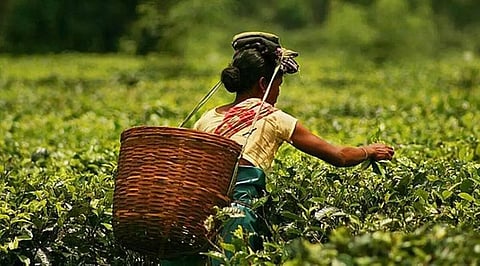
- Home
- Live Blog
- Breaking News
- Top Headlines
- Cities
- NE News
- Sentinel Media
- Sports
- Education
- Jobs

TEA WOES
* Average auction prices increase by only 56 per cent from 2008 to 2014
* 32 per cent of the tea bushes in Assam are over 50 years old
* Production fell to 589.77 million kg from 621.87 million kg in 2014
* Hike in labour wages
* Rise in cost of production
By Our Staff Reporter
Guwahati, July 18: While rising costs, low auction prices and weather effects on production have been plaguing the tea industry in Assam, the State government's move to "unreasobly" hike the daily wages of tea workers to Rs 137 is poised to further jeopardize the viability of the industry in the State.
In a departure from tradition, the State government-constituted sub-committee has hiked the minimum wages to Rs 137. Earlier, the wage hike was bilaterally settled through collective bargaining between the garden magements and workers.
The Consultative Committee of Planters Association (CCPA) and Assam Chah Majdoor Sangha (ACMS) had on February 26 inked a bilateral agreement, effecting a hike in the daily wages of workers in tea gardens. According to the three-year agreement, the wages with effect from January 1 this year was to be Rs 115. It would be raised to Rs 126 with effect from January 1 next year and further to Rs 137 in the third year.
The State government, however, did not ratify the CCPA-ACMS agreement for mysterious reasons this time as it had been "traditiolly" doing in the past.
The tea workers were entitled for a daily wage of Rs 94 as per the previous agreement.
"This year the CCPA and ACMS had agreed for wage of Rs 115. If one adds the additiol benefits - such as concessiol rations, statutory and non-statutory benefits - the wage adds up to Rs 250. In 1951, the Chetia Committee Report of the State government has clearly stated that 'in assessing minimum requirements, the additiol benefits provided by garden magements like housing, medical facilities and primary education may be taken into account," said an industry source.
Moreover, the magements have been paying a minimum bonus of 8.33% (irrespective of profit or loss of the company), which, the industry says, should be added to the cash component of the wages. "Normally bonus is profit-sharing. But in case of the tea industry in Assam, the gardens are paying a minimum bonus of 8.33 per cent irrespective of their profit or loss. Some gardens also pay up to 20 per cent. This means the workers are getting fourteen and half months' wages in a year. Various courts have said that this should be linked to the cash component of wages," said the source.
The source said that labour now accounts for 60 per cent of the cost of production - perhaps the highest in the world.
The industry employs around 12 lakh people directly and sustains the livelihood of 20 lakh people.
"Any unreasoble rise in wages in cash terms would impact upon the industry's economic survival as most of the gardens do not get good prices for quality tea in the auction market. Even the bigger players have little to cheer about as the auction prices do not remuneratively match their cost of production," the source said.
The State government, instead, should have taken steps to completely take over certain facilities such as schools, hospitals etc provided by the employer to relieve them of the high social costs, thus reducing the burden on cost of employment, the magements feel.
Pointing out to the reverses suffered by the tea industry, industry sources said auction averages have increased from Rs 99.60 in 2008 to Rs 156 in 2014, an increase of only 56 per cent. "As per the Tea Board of India, 32 per cent of the tea bushes in Assam are over 50 years old. The industry has been investing in replacements of old bushes by new plants at the rate of 2 per cent per year since the beginning of the 12th Plan to address the problem of low yield.
The industry is also not happy at the government's move to classify the tea workers as semi-skilled workers. "Tea workers are classified as unskilled by the government itself. Even the minimum wages fixation is not for unskilled workers. It is strange that the government has come up with a notification classifying tea plucking, hoeing, cheeling as semi-skilled. Would it not push the wages up further and drive the industry to sickness? No other state in India has classified tea-pluckers as semi-skilled," the magements rue.
"The industry is already facing so many hurdles. The minimum wage issue still hangs. There is uncertainty over the ration subsidy. The gardens are also staring at a shortage of fuel arising out of NGT's ban on rat hole coal mining in Meghalaya. In such a situation, when the industry needed relief, the government intends to heap more burdens on it," lamented an industry executive.
Last year, tea production in Assam dropped significantly, due to bad weather. The production fell to 589.77 million kg from 621.87 million kg the previous year. Projections are that production might drop this year too.
The tea industry is worried that if the government fails to consider the adversities being faced by the gardens, it may lead to sharp drop in employment levels and even industrial sickness like it happened in the ATCL gardens.